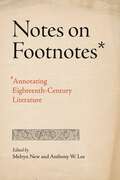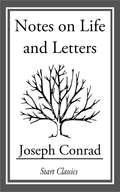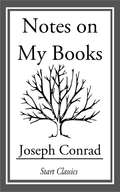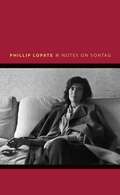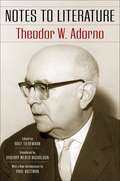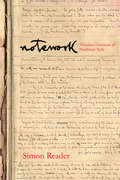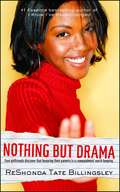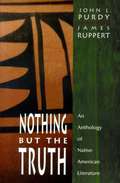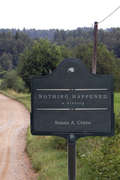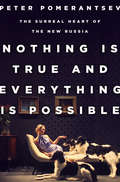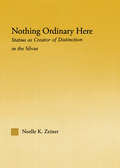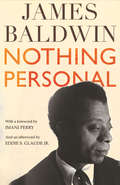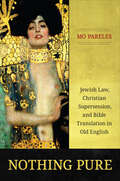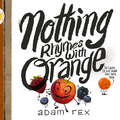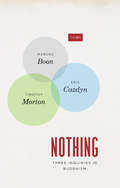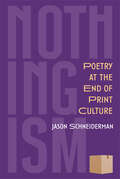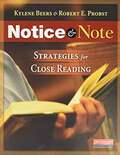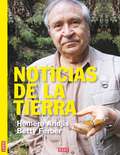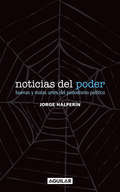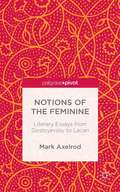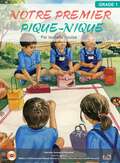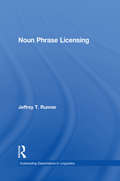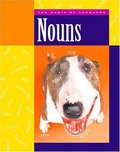- Table View
- List View
Notes on Footnotes: Annotating Eighteenth-Century Literature (Penn State Series in the History of the Book)
by Melvyn New and Anthony W. LeeThis collection presents fourteen essays on annotating eighteenth-century literature. Authored by editors and annotators of current standard editions—such as California’s Works of John Dryden, the Florida Edition of the Works of Laurence Sterne, and the Yale Edition of the Works of Samuel Johnson—this book explores theoretical perspectives on critical editing and the practical work of annotation. Through examples from their own editorial work, the contributors illuminate the personal dilemmas and decisions confronting the annotator of texts: What information in the text needs annotation? When does one stop annotating? How does one manage the annotation-versus-interpretation problem?Brimming with erudition, Notes on Footnotes showcases the precision and attentiveness of some of the world’s foremost editors and annotators. The book is necessary reading—not only for scholars of the eighteenth century but also for scholarly editors of texts of all historical periods, book historians, and book lovers in general.In addition to the editors, the contributors include Kate Bennett, Robert DeMaria Jr., Michael Edson, Robert D. Hume, Stephen Karian, Elizabeth Kraft, Thomas Lockwood, William McCarthy, Maximillian E. Novak, Shef Rogers, Robert G. Walker, and Marcus Walsh.
Notes on Life and Letters
by Joseph ConradI don't know whether I ought to offer an apology for this collection which has more to do with life than with letters. Its appeal is made to orderly minds. This, to be frank about it, is a process of tidying up, which, from the nature of things, cannot be regarded as premature. The fact is that I wanted to do it myself because of a feeling that had nothing to do with the considerations of worthiness or unworthiness of the small (but unbroken) pieces collected within the covers of this volume. Of course it may be said that I might have taken up a broom and used it without saying anything about it. That, certainly, is one way of tidying up. But it would have been too much to have expected me to treat all this matter as removable rubbish. All those things had a place in my life. Whether any of them deserve to have been picked up and ranged on the shelf-this shelf-I cannot say, and, frankly, I have not allowed my mind to dwell on the question. I was afraid of thinking myself into a mood that would hurt my feelings; for those pieces of writing, whatever may be the comment on their display, appertain to the character of the man. And so here they are, dusted, which was but a decent thing to do, but in no way polished, extending from the year '98 to the year '20, a thin array (for such a stretch of time) of really innocent attitudes: Conrad literary, Conrad political, Conrad reminiscent, Conrad controversial. Well, yes! A one-man show-or is it merely the show of one man? The only thing that will not be found amongst those Figures and Things that have passed away, will be Conrad en pantoufles. It is a constitutional inability. Schlafrock und pantoffeln! Not that! Never! . . .
Notes on My Books
by Joseph ConradIn Notes on My Books (1920), Joseph Conrad recounts his experiences with the writing process. He recounts in detail his intentions and aspirations for each of his major works.
Notes on Sontag (Writers on Writers #2)
by Phillip LopateNotes on Sontag is a frank, witty, and entertaining reflection on the work, influence, and personality of one of the "foremost interpreters of . . . our recent contemporary moment." Adopting Sontag's favorite form, a set of brief essays or notes that circle around a topic from different perspectives, renowned essayist Phillip Lopate considers the achievements and limitations of his tantalizing, daunting subject through what is fundamentally a conversation between two writers. Reactions to Sontag tend to be polarized, but Lopate's account of Sontag's significance to him and to the culture over which she loomed is neither hagiography nor hatchet job. Despite admiring and being inspired by her essays, he admits a persistent ambivalence about Sontag. Lopate also describes the figure she cut in person through a series of wry personal anecdotes of his encounters with her over the years. Setting out from middle-class California to invent herself as a European-style intellectual, Sontag raised the bar of critical discourse and offered up a model of a freethinking, imaginative, and sensual woman. But while crediting her successes, Lopate also looks at how her taste for aphorism and the radical high ground led her into exaggerations that could do violence to her own common sense, and how her ambition to be seen primarily as a novelist made her undervalue her brilliant essays. Honest yet sympathetic, Lopate's engaging evaluation reveals a Sontag who was both an original and very much a person of her time.
Notes to Literature (European Perspectives: A Series in Social Thought and Cultural Criticism #Vol. 2)
by Theodor W. AdornoNotes to Literature is a collection of the great social theorist Theodor W. Adorno’s essays on such writers as Mann, Bloch, Hölderlin, Siegfried Kracauer, Goethe, Benjamin, and Stefan George. It also includes his reflections on a variety of subjects, such as literary titles, the physical qualities of books, political commitment in literature, the light-hearted and the serious in art, and the use of foreign words in writing. This edition presents this classic work in full in a single volume, with a new introduction by Paul Kottman.
Notework: Victorian Literature and Nonlinear Style (Stanford Text Technologies)
by Simon ReaderNotework begins with a striking insight: the writer's notebook is a genre in itself. Simon Reader pursues this argument in original readings of unpublished writing by prominent Victorians, offering an expansive approach to literary formalism for the twenty-first century. Neither drafts nor diaries, the notes of Charles Darwin, Oscar Wilde, Gerard Manley Hopkins, Vernon Lee, and George Gissing record ephemeral and nonlinear experiences, revealing each author's desire to leave their fragments scattered and unused. Presenting notes in terms of genre allows Reader to suggest inventive new accounts of key Victorian texts, including The Picture of Dorian Gray, On the Origin of Species, and Hopkins's devotional lyrics, and to reinterpret these works as meditations on the ethics of compiling and using data. In this way, Notework recasts information collection as a personal and expressive activity that comes into focus against large-scale systems of knowledge organization. Finding resonance between today's digital culture and its nineteenth-century precursors, Reader honors our most disposable, improvised, and fleeting written gestures.
Nothing But Drama (Good Girlz #1)
by ReShonda Tate BillingsleyThe first book in an exciting and inspiring new series from national bestselling author ReShonda Tate Billingsley Their lives are nothing but drama. . . . Camille can't believe her bad luck when she's ordered to join a church youth group after hiding her boyfriend from the police. She'll bide her time if that's what it takes to get everyone off her back, but it's the last place she ever expected to make a new friend. Angel has a secret that's got her running scared, so when she sees a flyer for the group, she heads to the church, hoping to find an answer to her problem. Now Rachel, their group leader, has a task for them that may just end their daily dramas and give them a whole new beginning. They just have to take a leap of faith. . . . Along the way, they meet tough-as-nails Jasmine and society-darling Alexis, forging friendships built on strength, loyalty, and faith. As the girls take up Rachel's challenge to honor their parents, they find that walking a new path isn't always the easiest way to go. But together, Camille, Angel, Jasmine, and Alexis will embark on adventures that only the best of friends can share.
Nothing But the Truth: An Anthology of Native American Literature
by John L. Purdy James RuppertThis anthology includes some of the best works of Native American Literature -- with a good representation of major authors, geographic dispersion, gender balance, and a variety of genres. Its illustrative and popular material promote a deeper appreciation of different themes and approaches. Complete works that have become classics in the field, combined with ones from the modern era, make this collection rich in historical and theoretical context. Selections of non-fiction, fiction, poetry, and drama, include works by Paula Gunn Allen, Elizabeth Cook-Lynn, Carter Revard, Leslie Marmon Silko, Sherman Alexie, Kimberly Blaeser, Peter Blue Cloud, Louise Erdrich, Scott N. Momaday, Simon Ortiz, and many more. An effective introduction to Native American Literature for readers interested in this area of writing.
Nothing Happened: A History
by Susan A. CraneThe past is what happened. History is what we remember and write about that past, the narratives we craft to make sense out of our memories and their sources. But what does it mean to look at the past and to remember that "nothing happened"? Why might we feel as if "nothing is the way it was"? This book transforms these utterly ordinary observations and redefines "Nothing" as something we have known and can remember. "Nothing" has been a catch-all term for everything that is supposedly uninteresting or is just not there. It will take some—possibly considerable—mental adjustment before we can see Nothing as Susan A. Crane does here, with a capital "n." But Nothing has actually been happening all along. As Crane shows in her witty and provocative discussion, Nothing is nothing less than fascinating. When Nothing has changed but we think that it should have, we might call that injustice; when Nothing has happened over a long, slow period of time, we might call that boring. Justice and boredom have histories. So too does being relieved or disappointed when Nothing happens—for instance, when a forecasted end of the world does not occur, and millennial movements have to regroup. By paying attention to how we understand Nothing to be happening in the present, what it means to "know Nothing" or to "do Nothing," we can begin to ask how those experiences will be remembered. Susan A. Crane moves effortlessly between different modes of seeing Nothing, drawing on visual analysis and cultural studies to suggest a new way of thinking about history. By remembering how Nothing happened, or how Nothing is the way it was, or how Nothing has changed, we can recover histories that were there all along.
Nothing Is True and Everything Is Possible: The Surreal Heart of the New Russia
by Peter PomerantsevIn the new Russia, even dictatorship is a reality show. <P><P>Professional killers with the souls of artists, would-be theater directors turned Kremlin puppet-masters, suicidal supermodels, Hell’s Angels who hallucinate themselves as holy warriors, and oligarch revolutionaries: welcome to the glittering, surreal heart of twenty-first-century Russia. It is a world erupting with new money and new power, changing so fast it breaks all sense of reality, home to a form of dictatorship-far subtler than twentieth-century strains-that is rapidly rising to challenge the West. <P><P>When British producer Peter Pomerantsev plunges into the booming Russian TV industry, he gains access to every nook and corrupt cranny of the country. He is brought to smoky rooms for meetings with propaganda gurus running the nerve-center of the Russian media machine, and visits Siberian mafia-towns and the salons of the international super-rich in London and the US. <P><P>As the Putin regime becomes more aggressive, Pomerantsev finds himself drawn further into the system. Dazzling yet piercingly insightful, Nothing Is True and Everything Is Possible is an unforgettable voyage into a country spinning from decadence into madness.
Nothing Ordinary Here: Statius as Creator of Distinction in the Silvae (Studies In Classics Ser. #11)
by Noelle K. ZeinerThrough a combined methodology of philology, social theory and archaeology this book offers a reinterpretation of Statius's Silvae.
Nothing Personal
by James BaldwinJames Baldwin&’s critique of American society at the height of the civil rights movement brings his prescient thoughts on social isolation, race, and police brutality to a new generation of readers.Available for the first time in a stand-alone edition, Nothing Personal is Baldwin&’s deep probe into the American condition. Considering the Black Lives Matter protests in the summer of 2020 – which were met with tear gas and rubber bullets the same year white supremacists entered the US Capitol with little resistance, openly toting flags of the Confederacy – Baldwin&’s documentation of his own troubled times cuts to the core of where we find ourselves today. Baldwin&’s thoughts move through an interconnected range of questions, from America&’s fixation on eternal youth, to its refusal to recognize the past, its addiction to consumerism, and the lovelessness that fuels it in its cities and popular culture. He recounts his own encounter with police in a scene disturbingly similar to those we see today documented with ever increasing immediacy. This edition also includes a new foreword from interdisciplinary scholar Imani Perry and an afterword from noted Baldwin scholar Eddie S. Glaude Jr. Both explore and situate the essay within the broader context of Baldwin&’s work, the Movement for Black Lives, the COVID-19 pandemic, and the presidency of Donald Trump. Nothing Personal is both a eulogy and a declaration of will. In bringing this work into the twenty-first century, readers new and old will take away fundamental and recurring truths about life in the US. It is both a call to action, and an appeal to love and to life.
Nothing Pure: Jewish Law, Christian Supersession, and Bible Translation in Old English
by Mo ParelesEarly English culture depended on a Judaism translated away from Jews. Revealing the importance of Jewish law to the workings of early Christian England, Nothing Pure presents a Jewish revision of the history of English Bible translation. The book illuminates the paradoxical process by which the abjection and dehumanization of Jews, a bitter milestone in the history of European racism, was first articulated in the cultural translation of Jewish literature. It locates Old English Bible translation within the history of cultural translation, so that instead of appearing as the romantically liberated fragments of a suppressed mode of literacy, these authorized and semi-authorized vernacular works can be seen as privileged texts appropriating a Jewish source culture into an English Christian host culture. Mo Pareles proposes a theory of translation called supersessionary translation to explain the aesthetics of these texts: while at first glance they appear to dismiss irrelevant Jewish laws according to an arbitrary pattern, closer analysis reveals that they are masterful attempts to subject the legacy of Judaism, through translation, to the control of a system that has purportedly superseded and replaced it. Ultimately, Nothing Pure demonstrates the surprisingly central role of Jewish law in translation to Christian identity in late Old English ecclesiastical and monastic writings.
Nothing Rhymes with Orange
by Adam RexWe all know nothing rhymes with orange. But how does that make Orange feel? Well, left out! When a parade of fruit gets together to sing a song about how wonderful they are—and the song happens to rhyme—Orange can't help but feel like it's impossible for him to ever fit in. But when one particularly intuitive Apple notices how Orange is feeling, the entire English language begins to become a bit more inclusive. Beloved author-illustrator Adam Rex has created a hilarious yet poignant parable about feeling left out, celebrating difference, and the irrefutable fact that nothing rhymes with orange. Plus, this is the fixed format version, which looks almost identical to the print edition.
Nothing: Three Inquiries in Buddhism (TRIOS)
by Timothy Morton Eric Cazdyn Marcus BoonThough contemporary European philosophy and critical theory have long had a robust engagement with Christianity, there has been no similar engagement with Buddhism—a surprising lack, given Buddhism’s global reach and obvious affinities with much of Continental philosophy. This volume fills that gap, focusing on “nothing”—essential to Buddhism, of course, but also a key concept in critical theory from Hegel and Marx through deconstruction, queer theory, and contemporary speculative philosophy. Through an elaboration of emptiness in both critical and Buddhist traditions; an examination of the problem of praxis in Buddhism, Marxism, and psychoanalysis; and an explication of a “Buddhaphobia” that is rooted in modern anxieties about nothingness, Nothing opens up new spaces in which the radical cores of Buddhism and critical theory are renewed and revealed.
Nothingism: Poetry at the End of Print Culture (Poets On Poetry)
by Jason SchneidermanWhat is the internet doing to poetry? Good question! In Nothingism, Jason Schneiderman grapples with the way that digital culture has begun to reshape America’s poetry landscape, examining this profound shift in the way that poetry is written, read, and taught. He dives into the history of the poetic line and how previous media (oral, manuscript, print) have shaped our understanding of exactly what a poem is. In considering the transformations of poetry in the digital age, he finds that the transition from print to digital culture mirrors the earlier transition from manuscript to print culture. In this collection, the essays range from blistering manifesto to deep historical dives to gentle classroom guidance to considerations of the poems of James Merrill and Agha Shahid Ali, moving between the theoretical and the practical. Nothingism is both deeply personal and highly erudite, providing an engaging and scholarly account of reading, writing, and teaching poetry as our world continues its unsupervised lurch toward digital culture.
Notice and Note: Strategies for Close Reading
by Kylene Beers Robert E. ProbstIn Notice and NoteKylene Beers and Bob Probst introduce 6 "signposts" that alert readers to significant moments in a work of literature and encourage students to read closely. Learning first to spot these signposts and then to question them, enables readers to explore the text, any text, finding evidence to support their interpretations. In short, these close reading strategies will help your students to notice and note. <p><p> In this timely and practical guide Kylene and Bob: <p> • examine the new emphasis on text-dependent questions, rigor, text complexity, and what it means to be literate in the 21st century <p> • identify 6 signposts that help readers understand and respond to character development, conflict, point of view, and theme <p> • provide 6 text-dependent anchor questions that • help readers take note and read more closely <p> • offer 6 Notice and Note model lessons, including text selections and teaching tools, that help you introduce each signpost to your students <p><p> Notice and Note will help create attentive readers who look closely at a text, interpret it responsibly, and reflect on what it means in their lives. It should help them become the responsive, rigorous, independent readers we not only want students to be but know our democracy demands. <p><p> A new Notice and NoteLiterature Log offers students practice finding the signposts-with over-the-shoulder coaching from Kylene and Bob. Save with 5-packs.
Noticias de la Tierra
by Homero Aridjis"El Grupo de los Cien es un movimiento de conciencia que trata de cambiar nuestra relación con la naturaleza. Gracias a este grupo, presidido por el santo poeta Homero Aridjis, todavía podemos disfrutar en nuestro mundo de la magia de la mariposa monarca, la tortuga marina y la ballena gris." Alejandro Jodorowsky El fundador del Grupo de los Cien nos entrega una obra invaluable sobre las acciones que esta organización ha llevado a cabo en favor de la protección del ambiente. Al mismo tiempo, nos conduce en un recorrido a través de las bellezas naturales de México, muestras de su enorme biodiversidad. Así, se develan maravillas como el cardón gigante, la tortuga marina, la ballena gris, la mariposa monarca, las Grutas del Tiempo, Cuatro Ciénegas o la selva Lacandona. En Noticias de la Tierra Homero Aridjis trata a fondo el tema de la ecología: informa, explica y denuncia lo que ha sucedido en este ámbito durante los últimos treinta años, tanto a escala nacional como internacional. Experto reconocido mundialmente, el autor narra su lucha continua contra funcionarios desinteresados y renuentes a intervenir para mejorar bosques y selvas; fauna marina y terrestre; ríos, mares y lagos.
Noticias del poder: Buenas y malas artes del periodismo político
by Jorge HalperínJorge Halperín entrevista a prestigiosas figuras como Eduardo Aliverti, Juan Luis Cebrián, Jorge Lanata, Rodolfo Terragno, entre otros, en busca del verdadero rol del periodismo político en la sociedad occidental de hoy. ¿Qué vínculo existe hoy entre el poder político y el periodismo que lo corteja y lo ataca? ¿Qué tipo de relación establecen los políticos y quiénes asumen el compromiso de informar a sus lectores, oyentes o televidentes? Noticias del poder ingresa en los oscuros vericuetos de ese contexto para mostrar cómo se construye la información, cómo se #instala# una agenda, cómo son las operaciones de prensa a las que el poder recurre para sostenerse. Jorge Halperín, profesional de reconocida trayectoria y autor de "Lo mejor de la siesta inolvidable" y "La entrevista periodística", entre otros títulos, dilucida en este libro el complejo nexo que existe entre los medios de comunicación y la política, y entrevista a figuras de ganado prestigio.
Notions of the Feminine: Literary Essays from Dostoyevsky to Lacan
by Mark AxelrodJust how do male novelists perceive their female characters? Are there subtle or not so subtle indications in the narrative that reflect the perceptions of the author rather than the narrator? And are some of these perceptions pre-conceived based on certain cultural biases? These are a few of the questions that Notions of the Feminine: Literary Essays from Dostoevsky to Lacan addresses. With that in mind, the essays examines those notions in such texts as: Dostoevsky's, Crime & Punishment; Tolstoy's, Anna Karenina; Lawrence's Women in Love and The Virgin and the Gypsy; Fuentes', The Old Gringo; Boll's, The Lost Honor of Katharina Blum; and with an additional essay based on Lacan's notion of The Gaze that is germane to the other texts.
Notre Premier Pique-Nique class 1 - MIE
by Par Isabelle Louise"Notre Premier Pique-Nique" présente une histoire captivante centrée autour d'une expérience de pique-nique pour les jeunes élèves. Lors de cette aventure, les enfants se dirigent vers un parc voisin de leur école, accompagnés de leur enseignante, Miss Dina. Installés pour le goûter, ils partagent leurs provisions et découvrent ce que chacun a apporté. Miss Dina montre ses achats, soulignant ainsi l'aspect convivial du moment. Après le goûter, les enfants sont laissés libres pour jouer. Cependant, le temps passe vite et le retour en classe est annoncé avec l'arrivée du van. Ce livre engage les élèves dans une exploration interactive du vocabulaire et des activités associées aux pique-niques, tout en incitant à partager leurs expériences personnelles. Il vise à développer leur compréhension du récit tout en suscitant leur intérêt pour les moments de partage en plein air.
Noun Phrase Complexity in English
by Eva BerlageThis book explores noun phrase complexity in English, showing that it is best accounted for both by a linear and a hierarchical parameter: its length and its type of postmodifier(s). The study is methodologically unique in that it combines univariate and multivariate analyses in an investigation of four different syntactic variables. Drawing on more than three billion words of British and American data, Eva Berlage shows that the length and the structure of the NPs, along with language-external factors such as the regional variety of English, work as powerful determinants of the variation. On a theoretical level, the book reveals that the structural complexity of NPs cannot be sufficiently captured by (phrasal) node counts but that we need to incorporate the degree to which NPs are sentential. The book is designed for researchers and students interested in syntax, language variation, sociolinguistics, structural complexity and the history of English.
Noun Phrase Licensing (Outstanding Dissertations in Linguistics)
by Jeffrey T. RunnerThis book examines the syntax of direct object noun phrases in English within the Principles and Parameters, specifically Chomsky's Minimalist Program, approach to generative grammar. The main focus is on the phrase structural positions of object noun phrases at the various levels of representation, and secondarily on the relationship between structural position and semantic interpretation. Supported by a variety of empirical and conceptual arguments, the central claim of the book is that direct object noun phrases in English surface in a VP-external position; a secondary claim is that while in the overt syntax direct objects appear VP-externally, their position at the level of logical form varies depending on interpretation. Four basic constructions are studied: simple transitive clauses, transitive clauses with prepositional objects, the "raising to object" construction, and the "double object" construction. This book will be of interest to scholars in the areas of phrase structure syntax, English and Germanic syntax, the syntax-semantics interface, and all areas of generative approaches to syntax.
Nouns (The Magic of Language)
by Ann HeinrichsA book about nouns? How could you have a book without them? Nouns make up the world around us, and they make up most of our writing and speaking, too. With this book, young readers will learn how to identify and use different kinds of nouns.
